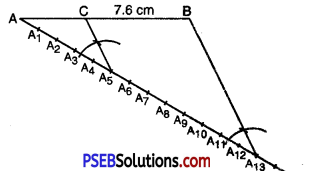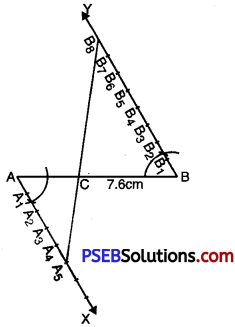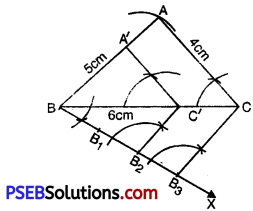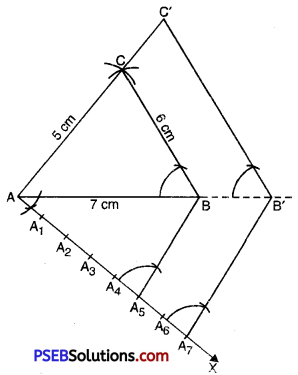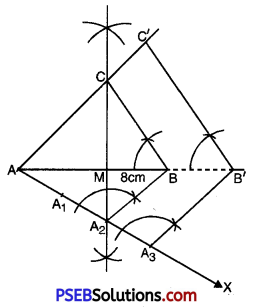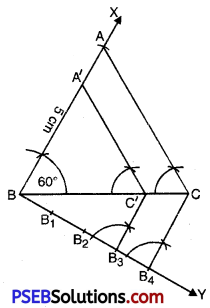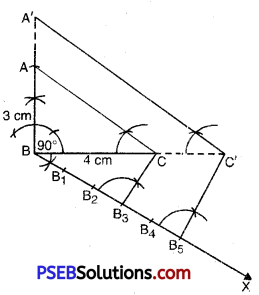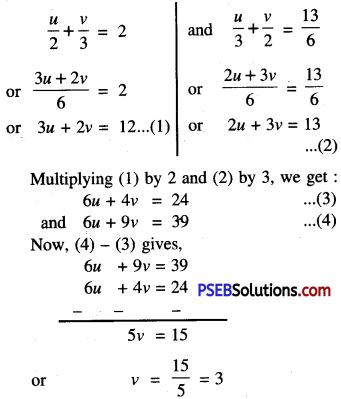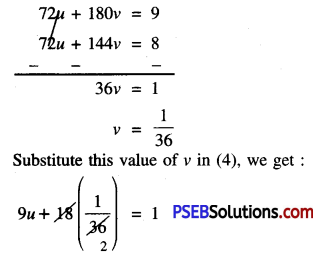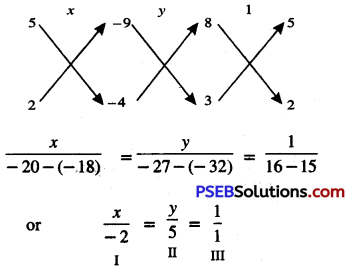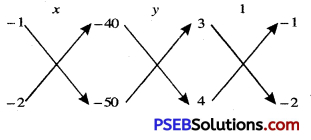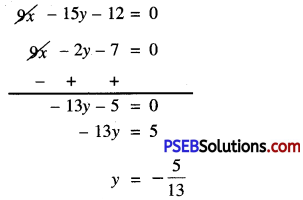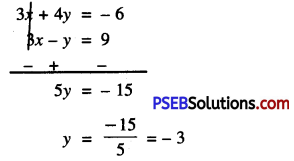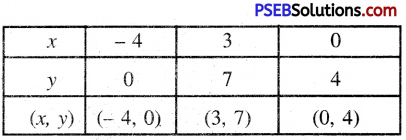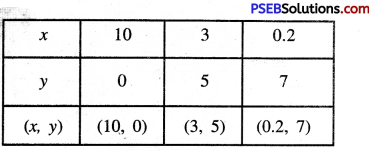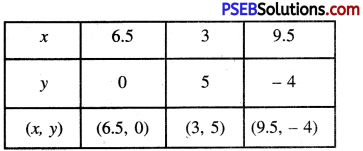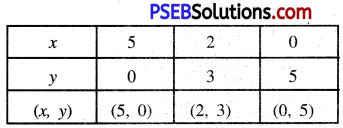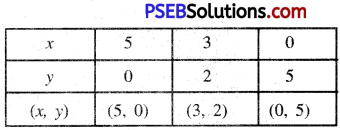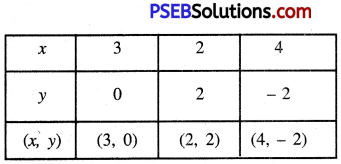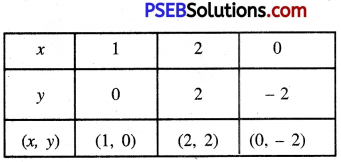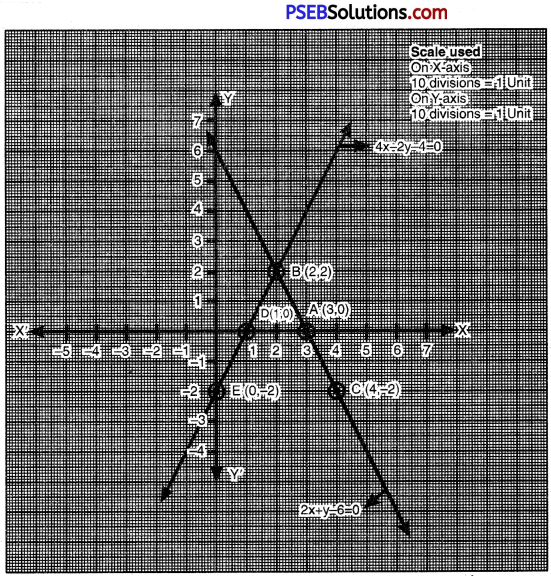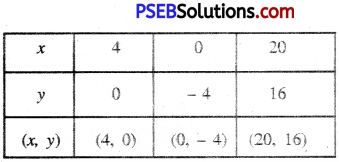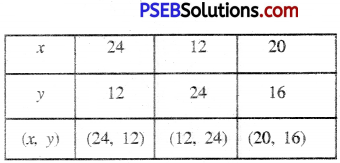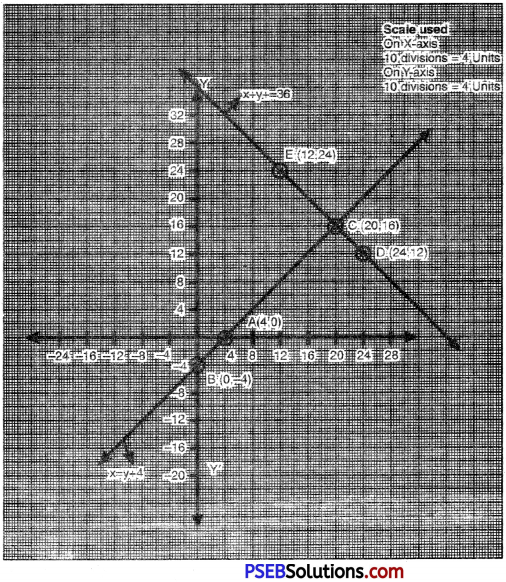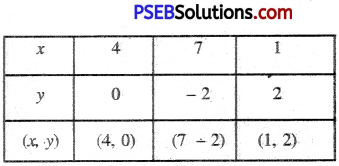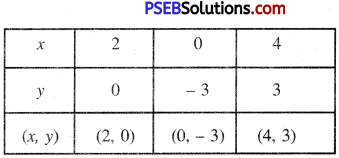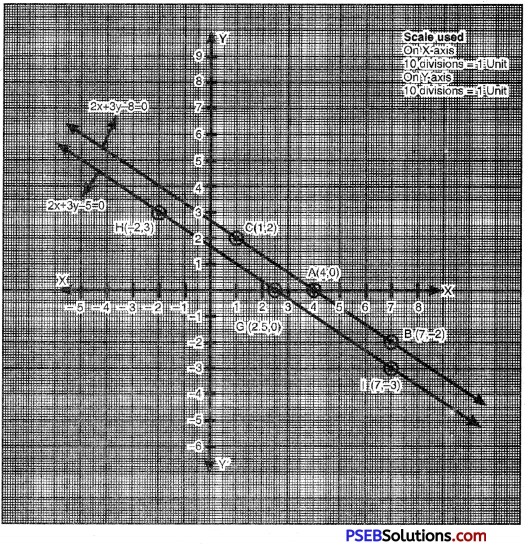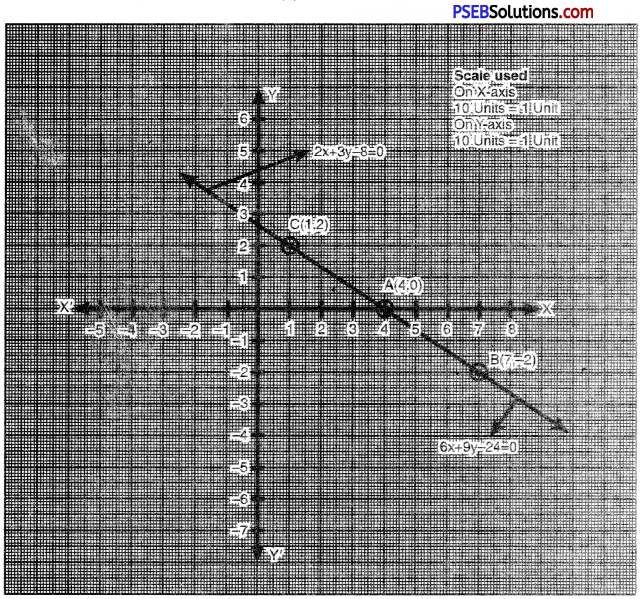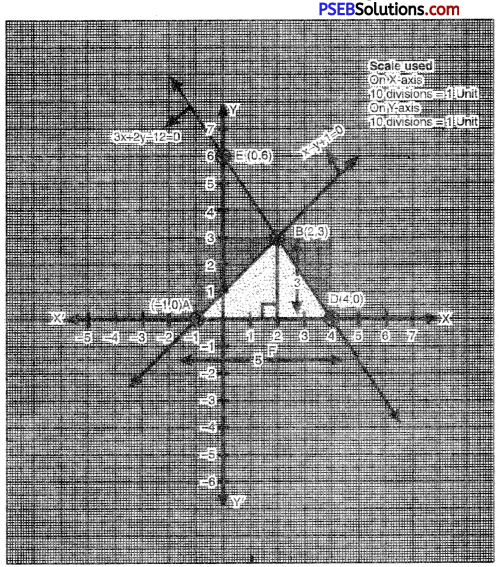Punjab State Board PSEB 10th Class Maths Book Solutions Chapter 11 Constructions Ex 11.2 Textbook Exercise Questions and Answers.
PSEB Solutions for Class 10 Maths Chapter 11 Constructions Ex 11.2
In each of the following, give also the justification of the construction.
Question 1.
Draw a circle of radius 6 cm from a point 10 cm away from its centre, construct the pair of tangents to the circle and measure their lengths.
Solution:
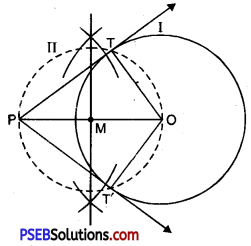
Steps of construction:
1. Draw a circle (1) of radius 6 cm.
2. Take a point ‘P’ at a distance of 10 m. from the centre of the circle. Join OP.
3. Draw perpendicular bisector of OP. Let ‘M’ be the mid point OP.
4. With ‘M’ as centre and radius MO, draw a circle (II) which intersects the circle (I) at T and T’.
5. Then FT and PT’ are two required tangents.
![]()
Justification of construction:
We know that tangent at a point is always perpendicular to the radius at the point. Now
we have to prove that ∠PTO = ∠PT’O = 90°.
OT is joined.
Now, PMO is the diameter of circle (II) and ∠PTO is in the semicircle.
∴ ∠PTO = 90° [Angle in semicircle is a right angle].
Similarly, ∠PT’O = 90°
∴ PT and PT’ has to be the tangents to the circle at T and T’.
(On measuring, the lengths of tangents
i.e., PT = 8.1 cm
PT’ = 8.1 cm.
Co-centric circles. Two or more circles having same centre but different radii are called CO-CENTRIC circles.
![]()
Question 2.
Construct a tangent to a circle of radivs 4 cm from a point on the co-centric circle of radIus 6 cm and measure its length.
Also, erify the measurement by actual calculation.
Solution: Steps of construction:
STEPS OF CONSTRUCTION:
1. Draw a circle with cente O’ and radius 4 cm. Mark it as 1
2. Draw another circle with same centre ‘O’ and radius 6 cm and mark it as II.
3. Take any point ‘P’ on circle II. Join OP.
4. Draw pependicu1ar bisector of OP. Let it intersects ‘OP’ at M.
5. With M is centre and radius MO’ or ‘MP’, draw a circie III which intersects the circle ‘1’ at T and T’.
6. Join PT.
PT is the required tangent.

Justification of the construction :
Join OT.
Now OP is the diameter of the circle III.
∠OTP is in the semicircle.
∴ ∠OTP = 90° …………….(1)
[∴ Angle in a semicircle isa right angle]
Now OT ⊥ PT [using (I)]
∵ A line which makes an angle of 900 with radius at any point on the circle, the line is tangent to the circle.
∴ PT is tangent to the circle ‘I’
i.e. PT is tangent to the circle of radius 4.5 cm.
![]()
To calculate the length of tangent:
Consider ∆OTP,
∠OTP = 90° [using (i)]
∴ ∆OTP is a right angled triangle.
OT = 4 cm [Radius of I circle (given)]
OP = 6 cm [Radius of the II circle (given)]
PT = ? [to be calculated]
In rt. triangle ∆OTP,
By Pythagoras theorem
OP2 = OT2 + PT2
[(Hyp)2 = (Base)2 + (Perp.)2]
or PT2 = OP2 – OT2
= 62 – 42
= 36 – 16 = 20
PT = \(\sqrt{20}\) cm
= 2√5 = 2 × 2.24 = 4.48 cm.
So, length of tangent by actual calculation = 4.48 cm = 4.5 cm.
Length of tangent by measurement = 4.5 cm
Hence, the length of tangent ‘PT’ is verified.
![]()
Question 3.
Draw a circle of radius 3 cm. Take two points P and Q on one of its extended diameter each at a distance of 7 cm from its centre. Draw tangents to the circle from these two points ‘P’ and ‘Q’.
Solution:
Steps of construction:
1. Draw a circle of radius 3 cm and centre ‘O’.
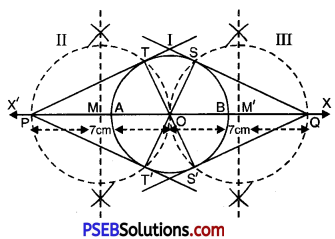
2. Draw its diameter ‘AB’ and extend it in both directions as OX and OX’.
3. Take a point P’ on OX” direction and ‘Q’ on OX’ direction such that OP = OQ = 7 cm.
4. Draw perpendicular bisectors of OP and OQ which intersects OP and OQ at ‘M’ and ‘M” respectively.
5. With ‘M’ as centre and radius = ‘MO’ or MP, draw a circle ‘II’ which intersects the circle ‘I’ at T and T’.
6. Similarly with ‘M’’ as centre and radius = M’O or MQ, draw a circle (III) which intersects the circle ‘I’ at S’ and ‘S’’.
7. Join PT, PT’ and QS and QS’.
Justification of construction :
Join OT’ and ‘OT” and ‘OS’ and OS’.
To prove ‘PT & PT’ tangents to the circle
we will prove that ∠PTO = ∠PT’O = 90°.
Now ‘OP’ acts as the diameter of circle ‘II’ and ∠OTP is in the semicircle.
∴ ∠OTP = 90° …………….(1) [∵ Angle in semicircle is 90°]
But ‘OT’ is the radius of circle ‘I’ and line ‘PT’ touches the circle at T’.
∵ The line which touches the circle at a point and makes an angle of 90° with radius at that point, is tangent to the circle.
∴ PT is tangent to the circle I at point T through point ‘P.
Similarly PT’, QS and QS’ are tangents to the circle I.
![]()
Question 4.
Draw a pair of tangents to a circle of radius 5 cm which are inclined to each other at an angle of 60°
Solution:
Steps of construction:
1. Draw the rough sketch of required figure.

∵ the tangents make an angle of 60° with each other.
∠OTP = ∠OQT = 90°
[Tangent is perpendicular to the radius of circle]
1. To find inclination of radii with each other
∠TOQ + ∠OTP + ∠OQT + ∠TPQ = 360° [Angle sum property of quad.]
or ∠TOQ + 90° + 90° + 60 = 360°
or ∠TOQ = 360 – 90° – 90° – 60° = 120°
2. Draw a circle of radius 5 cm.
3. Draw two radii of circle which make an angle of 120° with each other.
4. The radii intersect the circle at ‘A’ and
5. Make an angle of 90° at each point A and B, which intersect each other at ‘P’.
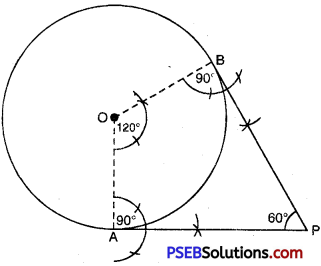
6. PA and PB are the required tangents.
![]()
Question 5.
Draw a line segment AB of length 8 cm. Taking ‘A’ as centre, draw a circle of radius 4 cm and taking ‘B’ as centre, draw another circle of radius 3 cm. Construct tangents to each circle from the centre of the other circle.
Solution:
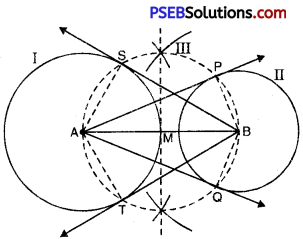
Steps of construction :
1. Draw a line segment AB = 8 cm.
2. With ‘A’ as centre and radius 4 cm, draw a circle (I)
3. With ‘B’ as centre and radius 3 cm, draw a circle ‘I’.
4. Draw the perpendicular bisector of line segment AB which inersects ‘AB’ at ‘M’.
5. With ‘M as centre and radius MA or MB. draw a circle (III) which intersects the circle (I) at ‘S’ and ‘T’ and circle (II) at ‘P’ and ‘Q’.
6. Join ‘AP’ and AQ’. These are required tangents to the circle with radius 3 cm. from point ‘A’.
7. Join ‘BS’ and ‘BT’. These are required tangents to the circle with radius 4 cm from point ‘B’.
Justification of Construction:
In circle (III), AB acts as diameter then ∠ASB and ∠BPA are in semicircle.
∴ ∠ASB = 90° ………………(1) [Angle in semicircle]
and ∠BPA = 90° .
But ∠ASB is angle between radius of circle (I) and line segment BS’ and ∠BPA is angle between radius of circle (II) and line segment ‘AP’.
∵ Line segment which is perpendicular to the radius of circle, is tangent to the circle through that point.
∴ BS is tangent to circle (I) at point ‘S’ and AP is tangent to circle (II) at point ‘P’.
Similarly AQ and BT are tangents to the circle (II) and (I) respectively.
![]()
Question 6.
Let ABC be a right triangle in which AB = 6 cm, BC = 5 cm and ∠B = 90°. BD is the perpendicular from B on AC. The circle through B, C, D is drawn. Construct the tangents from ‘A’ to this circle.
Solution:
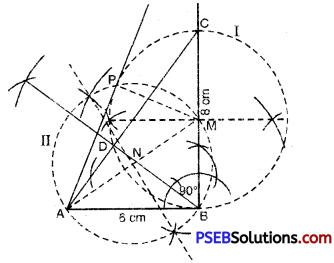
Steps of construction:
1. Construct rt. angled triangle. ABC according to given conditions and measurements.
2. Draw BD ⊥ AC.
3. Take mid point of side BC take it as
4. Take ‘M’ as centre and BC as diameter,
draw a circle through B. C, D using property, angle in semicircle is 90° (∠BDC 90°). Take this circle as I.
5. Now join ‘A’ and ‘M.
6. Draw perpendicular bisector of AM intersecting AM in point N. Now with ‘N’ as centre and ‘NA or ‘NM’ as radius, draw a circle (II) which intersects the circle (I) at ‘B’ and ‘P’.
7. Join AP.
8 AP and AB are the required tangents.
Justification of construction:
Line segment AM’ is diameter of circle (II)
∠APM is in semicircle
∴ ∠APM = 90° [Angle in semicircle]
i.e., MP ⊥ AP
But ‘MP’ is the radius of circle (I)
∴ AP is tangent to the circle (II)
[∵ Any line ⊥ to radius of circle at any point on the circle is tangent to the circle.]
Similarly AB is tangent to circle (I).
Question 7.
Draw a circle with the help of a bangle. Take a point outside the circle. Construct the pair of tangents from this poiñt
to the circle.
Solution:
To draw circle with bangle means the centre of circle is unknown. First find the centre of circle.
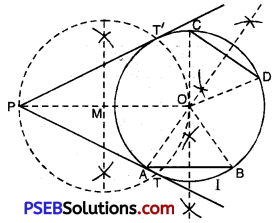
Steps of construction:
1. Draw a circle. using a bangle (I).
2. Take any two chords AB and CD (non parallel) on circle.
3. Draw the perpendicular bisectors of chords AB and CD. The perpendicular bisectors intersect each other
[∵ any point lying on perpendicular bisector of line segment is equidistant from its end points
[∵ ‘O’ lies on ⊥ bisector of AH and CD]
∴ OA = OB and OC = OD
∴ OA = OB = OC = OD (Radii of circle)
∴ ‘O’ is the centre of circle.
4. Take any point ‘P’ out side the circle.
5. Join OP.
6. Draw the perpcndicular bisector of OP let ‘M’ the mid point of OP.
7. With ‘M’ as centre and radius ‘MP’ or ‘MO’, draw a circle II which intersects the circle (I) at T and T’.
8. Join PT and PT’, which is required pair of tangents.
Justification of construction:
Tangent at a point is always perpendicular to the radius at the point. Now, we have to prove
that ∠PTO = PT’O = 90°
Join OT.
Now ∠PTO is in the semicircle I.
∵ ∠PTO = 90° [Angle in semicircle is a right angle]
Similarly ∠PT’O = 90°
∴ PT and PT’ has to be the tangents to the circle at T and T’.

